精品:新目标八年级英语上册复习提纲(全套)
新目标英语八年级上册1-6各单元期中复习提纲课件
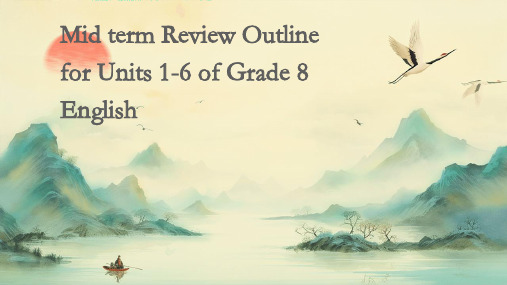
Key points of the text
分析文章结构和写作技巧
学生应能够分析Unit 1中阅读材料的不同段落和结构,了解 常见的写作技巧和手法,如对比、因果、转折等,以及如何 通过语言手段如词汇、句型和修辞来增强表达效果。
Key points of the text
评价文章内容与价值
学生应能够对Unit 1中的阅读材料进行评价,包括内容的 真实性、观点的合理性和价值取向等,同时能够结合自己 的生活经验和知识背景进行思考和判断。
熟悉Unit 6中的语 法重点,如时态、 语态、主谓一致等。
掌握常见的固定搭 配和习惯用法,提 高语言表达能力。
掌握核心语法
通过例句和练习, 深入理解语法规则, 并能够正确运用。
了解语法的不同形 式和变化,以便更 好地理解和运用。
Key points of the text
理解文章要点
熟悉Unit 6中的课文内容, 了解文章的主题和主要观 点。
Mid-term exams provide students with an opportunity to assess their progress and identify areas where
they need to improve.
The results of mid-term exams can be used by teachers to identify
学生应能够运用Unit 4中的词汇进行造句,以检验他 们பைடு நூலகம்词汇的掌握程度。教师可以提供一些例句,让学生 模仿造句,或者给出一些词汇,让学生自由发挥。
Grammar Focus
掌握基本句型
学生应掌握Unit 4中的基本句型,包括简单句、并列 句和复合句。教师应通过例句和练习题来帮助学生理解 句型的结构和特点。
八年级英语上册复习资料大全
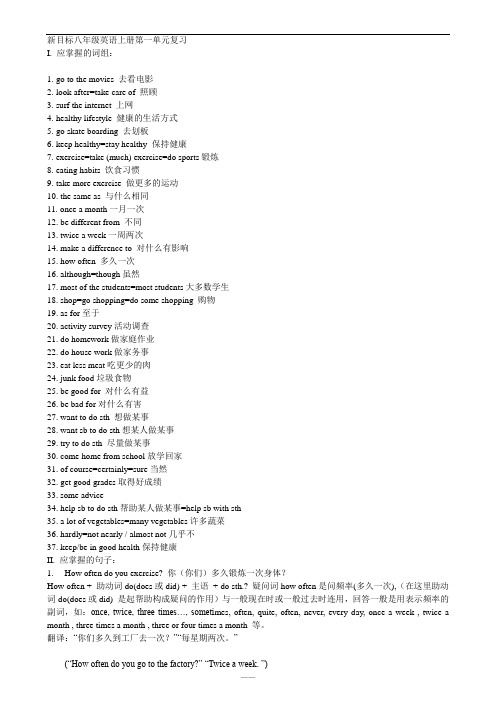
新目标八年级英语上册第一单元复习I. 应掌握的词组:1. go to the movies 去看电影2. look after=take care of 照顾3. surf the internet 上网4. healthy lifestyle 健康的生活方式5. go skate boarding 去划板6. keep healthy=stay healthy 保持健康7. exercise=take (much) exercise=do sports锻炼8. eating habits 饮食习惯9. take more exercise 做更多的运动10. the same as 与什么相同11. once a month一月一次12. be different from 不同13. twice a week一周两次14. make a difference to 对什么有影响15. how often 多久一次16. although=though虽然17. most of the students=most students大多数学生18. shop=go shopping=do some shopping 购物19. as for至于20. activity survey活动调查21. do homework做家庭作业22. do house work做家务事23. eat less meat吃更少的肉24. junk food垃圾食物25. be good for 对什么有益26. be bad for对什么有害27. want to do sth 想做某事28. want sb to do sth想某人做某事29. try to do sth 尽量做某事30. come home from school放学回家31. of course=certainly=sure当然32. get good grades取得好成绩33. some advice34. help sb to do sth帮助某人做某事=help sb with sth35. a lot of vegetables=many vegetables许多蔬菜36. hardly=not nearly / almost not几乎不37. keep/be in good health保持健康II. 应掌握的句子:1. How often do you exercise? 你(你们)多久锻炼一次身体?How often + 助动词do(does或did) + 主语+ do sth.? 疑问词how often是问频率(多久一次),(在这里助动词do(does或did) 是起帮助构成疑问的作用)与一般现在时或一般过去时连用,回答一般是用表示频率的副词,如:once, twice, three times…, someti mes, often, quite, often, never, every day, once a week , twice a month , three times a month , three or four times a month 等。
新目标英语八年级上册1--6_各单元期中复习提纲课件

4、一些学生一周上一两次网。 Some students surf the Internet once or twice a week. 5、你每天晚上睡几个小时? How many hours do you sleep every night ? 6、因此我可能有几分不健康,尽管我有一个健康的习惯。 So maybe I’m kind of unhealthy , although I have a healthy habit . 7、吃水果对我们的健康有好处。 Eating fruit is good for our health . 8、我尽量每天都做运动。 I try to do exercise every day .
15.好主意。 That’s a good idea. 好主意。 好主意 16.我感觉不舒服。 我感觉不舒服。 我感觉不舒服 I’m not feeling well=I don’t feel well=I feel terrible/bad. 17.太糟了。That’s too bad. 太糟了。 太糟了 18.我(不)是这样认为的。 I (don’t) think so. 是这样认为的。 我 不 是这样认为的 19.我希望你能尽快好起来。 我希望你能尽快好起来 我希望你能尽快好起来。
25.大量 许多 a lot of = lots of 大量,许多 大量 26.当然 of course =sure = certainly 当然 27.注意健康 look after my health 注意健康 28.有健康的生活方式 have a healthy lifestyle 有健康的生活方式 29.帮助某人做某事 help sb (to) do/with sth 帮助某人做某事 30.取得好成绩 get good grades 取得好成绩 31.学得好 更好 最好 study well / better / best 学得好/更好 学得好 更好/最好 32.为什么不做某事 为什么不做某事? 为什么不做某事 why not do sth?= why don’t you /we do sth? 33.与…相同 be the same as… 与 相同 34.与…不同 be different from… 与 不同 35. (…和 …)的不同点 和 的不同点 the differences (between…and …) 有几分/一点 36.有几分 一点不健康 be kind of unhealthy 有几分 一点不健康
人教新目标八年级英语上册重难点知识点归纳
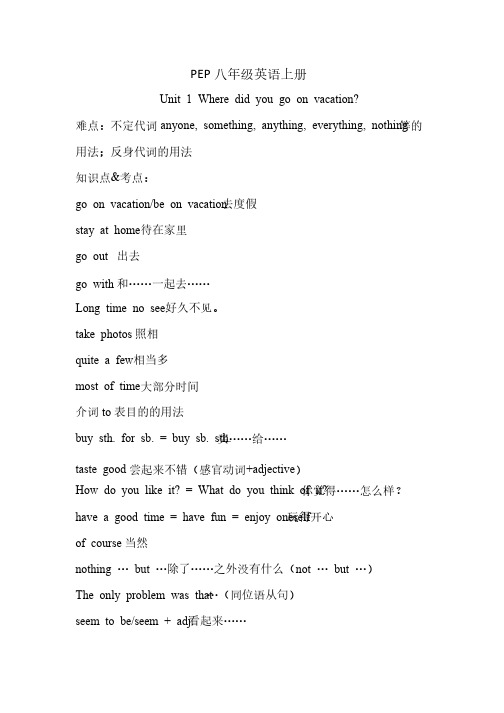
PEP八年级英语上册八年级英语上册Unit 1 Where did you go on vacation? 难点:不定代词anyone, something, anything, everything, nothing等的用法;反身代词的用法用法;反身代词的用法知识点&考点:考点:go on vacation/be on vacation 去度假去度假stay at home 待在家里待在家里待在家里go out 出去出去go with 和……一起去……和……一起去……Long time no see. 好久不见。
好久不见。
take photos 照相照相quite a few 相当多相当多相当多most of time 大部分时间大部分时间大部分时间表目的的用法介词to表目的的用法buy sth. for sb. = buy sb. sth. 买……给……买……给……taste good 尝起来不错(感官动词+adjective)How do you like it? = What do you think of it? 你觉得……怎么样?你觉得……怎么样?have a good time = have fun = enjoy oneself玩得开心玩得开心of course 当然当然nothing …but …除了……之外没有什么(not …but …)…)The only problem was that …(同位语从句)…(同位语从句)seem to be/seem + adj. 看起来……看起来……keep a diary 记日记记日记记日记 + at + 小地点小地点小地点arrive + in + 大地点大地点大地点 decide to do 决定做某事决定做某事决定做某事 try doing sth. 尝试做某事尝试做某事尝试做某事 try to do sth. 尽力做某事尽力做某事feel like 感觉到感觉到 feel like + n./ v-ing 想要……想要……ride … to …骑……到………骑……到……许多的:a lot of + 可数名词可数名词 lots of + 可数可数or 不可数名词不可数名词 I wonder that …我想知道………我想知道………我想知道…… in the past 在过去在过去在过去 enjoy doing sth. 享受做某事享受做某事享受做某事 walk around 到处逛逛到处逛逛感叹句:What + 冠词冠词 + adj. + n. + (it is) = How + adj. + 冠词冠词 + n. + (it is) start start doing doing doing sth. sth. 开始做某事开始做某事 stop stop doing doing doing sth. sth. 停止做某事停止做某事 finish finish doing doing sth. 结束做某事结束做某事because & so (不可同用)(不可同用)(不可同用) wait for …等待………等待……because of + n. a little/ a few 一些(两者的区别,以及与little/few 的区别)的区别) enough + n. / adj. + enough as + adj./adv. + as 和……一样……和……一样……one bowl of …一碗………一碗……along the way 沿着这条路沿着这条路沿着这条路 时间段+ later = after + 时间段……之后时间段……之后other, others, the other, the others, another on trip 在旅途中在旅途中find out 找到,找出找到,找出 / find 寻找寻找 / look for 寻找寻找寻找 so + adj. + that + 从句如此……以致……从句如此……以致……tell sb. (not) to do sth. 告诉某人(不要)做某事告诉某人(不要)做某事keep doing sth. / go on doing sth. 继续做某事继续做某事keep sth. + adj. 使……保持……状态使……保持……状态up and down (人)来来往往;(人)来来往往;(物)上上下下(物)上上下下in excitement = excitedly 兴奋地兴奋地come up / come out / come on / come in forget to do sth. 忘记做某事忘记做某事 forget doing sth. 忘记做过某事忘记做过某事忘记做过某事 like / dislike + n. / v-ing 喜欢/不喜欢某物/做某事做某事something + adj. ……的事情……的事情……的事情 Why not + v. = Why don ’t you + v. 为什么不……呢?为什么不……呢?Unit 2 How often do you exercise? 重点:1. How often 句型的运用;2. 2. 六个频度副词六个频度副词never, hardly ever, sometimes, sometimes, often, often, often, usually, usually, usually, always always 的差异、理解及使用;3. 频率数词once, twice 等的认识和运用;4. 一般现在时不同人称谓语形式的变化及一般疑问句的问答。
八年级上册英语复习提纲
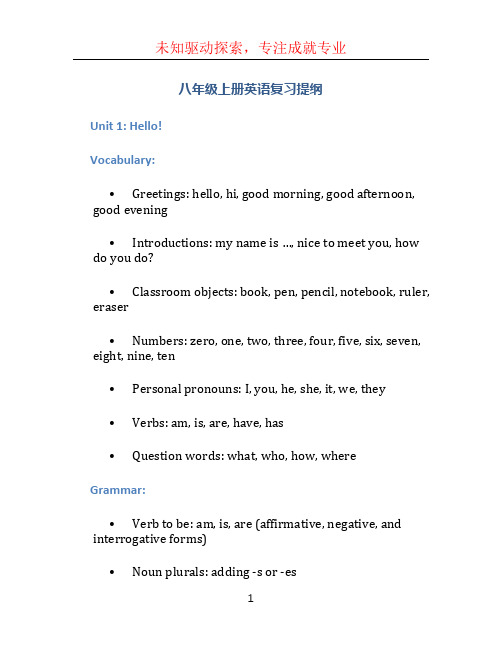
八年级上册英语复习提纲Unit 1: Hello!Vocabulary:•Greetings: hello, hi, good morning, good afternoon, good evening•Introductions: my name is …, nice to meet you, how do you do?•Classroom objects: book, pen, pencil, notebook, ruler, eraser•Numbers: zero, one, two, three, four, five, six, seven, eight, nine, ten•Personal pronouns: I, you, he, she, it, we, they•Verbs: am, is, are, have, has•Question words: what, who, how, where Grammar:•Verb to be: am, is, are (affirmative, negative, and interrogative forms)•Noun plurals: adding -s or -es•Possessive adjectives: my, your, his, her, its, our, their•Present simple tense: affirmative, negative, and interrogative forms•Demonstrative pronouns: this, that, these, those•Wh-questions: what, who, how, where (asking for information)Skills:•Greeting and introducing oneself to others•Describing classroom objects•Expressing possession•Asking and answering questions about people and objects•Giving personal information•Describing daily routinesUnit 2: School LifeVocabulary:•Classroom subjects: English, math, science, history, geography•School facilities: library, laboratory, computer room, playground•School supplies: pencil case, backpack, textbook, notebook•Adjectives to describe school: big, small, old, new, interesting, boring•Daily routines: get up, have breakfast, go to school, have lunch, go home, do homeworkGrammar:•Present simple tense: negative and interrogative forms•Adjectives for describing objects•Adverbs of frequency: always, usually, often, sometimes, rarely, never•Demonstrative pronouns: this, that, these, those (review)•Prepositions of time: in, on, at (for daily routines)•Imperatives: get up, have breakfast, go to school, etc. (giving orders or instructions)Skills:•Talking about school subjects and facilities•Describing school supplies and personal routines•Giving instructions or orders•Talking about frequency of activities•Understanding prepositions of timeUnit 3: Family and FriendsVocabulary:•Family members: mother, father, sister, brother, grandparents, aunt, uncle•Personal characteristics: kind, friendly, funny, smart, talented•Possessions: toys, clothes, shoes, books, bags•Adjectives to describe people: tall, short, thin, fat•Verbs for family activities: eat, drink, play, watch, sing, dance, readGrammar:•Possessive pronouns: mine, yours, his, hers, ours, theirs•Present simple tense: affirmative, negative, and interrogative forms (review)•Adjectives for describing people•Action verbs for activities•Wh-questions: who, what (review)Skills:•Talking about family members and personal characteristics•Describing possessions and appearance•Talking about activities with family and friends•Asking and answering questions about people and objectsUnit 4: Hobbies and InterestsVocabulary:•Hobbies: swimming, cycling, painting, playing soccer, reading, singing, dancing•Musical instruments: guitar, piano, violin, drums•Sports: basketball, baseball, tennis, volleyball, table tennis•Leisure activities: watching movies, playing computer games, shopping, traveling•Adjectives to describe hobbies and interests: fun, interesting, relaxing, excitingGrammar:•Present continuous tense: affirmative, negative, and interrogative forms•Adverbs of manner: carefully, well, quickly, slowly•Comparatives and superlatives: long, longer, longest; good, better, best•Prepositions of place: in, on, at (talking about locations)•Wh-questions: what, who, where, when (review) Skills:•Talking about hobbies and interests•Describing leisure activities•Talking about ongoing actions•Comparing things with superlative and comparative forms•Asking and answering questions about hobbies and interestsUnit 5: My CityVocabulary:•Buildings: school, hospital, library, supermarket, park, restaurant, bank•Places in the city: street, square, bus stop, train station, airport•Directions: turn left, turn right, go straight ahead•Modes of transportation: bus, subway, taxi, bike, car •Adjectives to describe cities: big, small, crowded, peaceful, modern, historicGrammar:•Present continuous tense: negative and interrogative forms (review)•Prepositions of place: in, on, at (review)•Simple future tense: will (affirmative, negative, and interrogative forms)•Imperatives for giving directions: turn left, go straight ahead, etc. (review)•Wh-questions: where, how (for asking about locations and directions)Skills:•Talking about buildings and places in the city•Describing cities and transportation modes•Giving and following directions in a city•Talking about future plans or activities in a city•Asking and answering questions about locations and directions。
人教新目标英语八年级上册unit1-Unit4单元重点知识复习
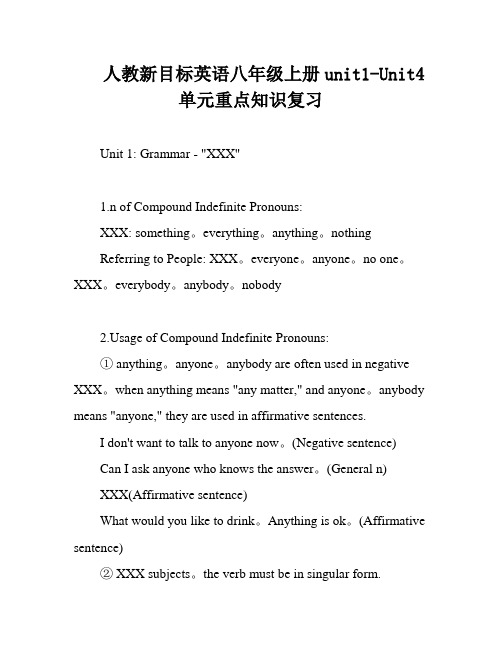
人教新目标英语八年级上册unit1-Unit4单元重点知识复习Unit 1: Grammar - "XXX"1.n of Compound Indefinite Pronouns:XXX: something。
everything。
anything。
nothingReferring to People: XXX。
everyone。
anyone。
no one。
XXX。
everybody。
anybody。
nobodyage of Compound Indefinite Pronouns:① anything。
anyone。
anybody are often used in negative XXX。
when anything means "any matter," and anyone。
anybody means "anyone," they are used in affirmative sentences.I don't want to talk to anyone now。
(Negative sentence)Can I ask anyone who knows the answer。
(General n)XXX(Affirmative sentence)What would you like to drink。
Anything is ok。
(Affirmative sentence)② XXX subjects。
the verb must be in singular form.Everyone here is from China.XXX.③ Adjectives XXX.Would you like to buy anything special?Can XXX interesting?④ When making requests。
(人教版新目标)八年级英语上册全册各单元知识点期末总复习讲解教学课件

3. feel like “感受到;摸起来”,后跟宾语 从句或名词。 I felt like I was a bird. 我感觉我是一只鸟。 It feels like a stone. 它摸起来像一块石头。
eg.something special; somewhere wonderful. 2.不定代词做主语时,谓语动词用第三人称单数。 eg.Is everybody here? 大家都到齐了吗?
1. get to/reach/arrive 都是“到达“的意思。
get to+sp=reach+sp = arrive at+sp(小)=arrive in+sp(大) 若他们后面要加地点副词here, there, home等,则 不需要加介词。
25、up and down上上下下 26、come up出来 27、enjoy oneself=have fun=have a good time
玩的开心
二、重要句子(语法):
1.Where did you go on vacation? 你到哪里去度假了?
I went to New York City. 我去了纽约城。
三、习惯用法、搭配
1. buy sth. for ab./ buy sb. sth. 为某人买某物 2. taste + adj. 尝起来…… 3. nothing to do but do除了……之外无事可干 4. seem + (to be) + adj 看起来 5. arrive in + 大地方 / arrive at + 小地方 到达某地 6. decide to do sth=make a decision决定做某事 7. try doing sth. 尝试做某事
新目标(Go for it)八年级英语上册全一册短语、语法知识点汇总(打包10套)8
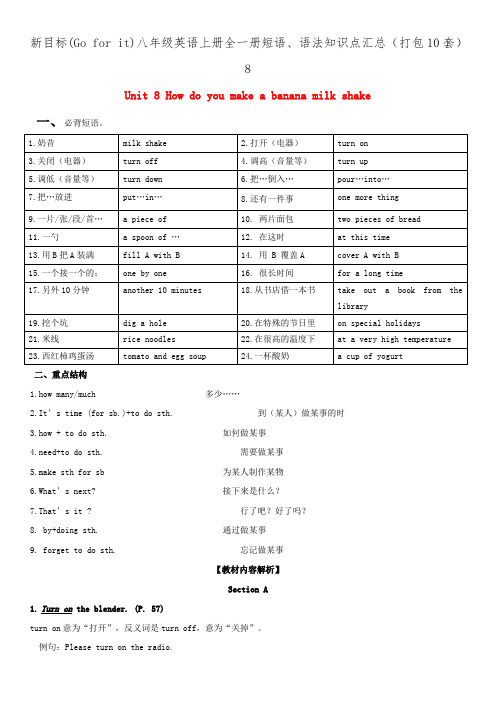
新目标(Go for it)八年级英语上册全一册短语、语法知识点汇总(打包10套)8Unit 8 How do you make a banana milk shake一、必背短语。
二、重点结构1.how many/much 多少……2.It’s time (for sb.)+to do sth. 到(某人)做某事的时3.how + to do sth. 如何做某事4.need+to do sth. 需要做某事5.make sth for sb 为某人制作某物6.What’s next?接下来是什么?7.That’s it ?行了吧?好了吗?8. by+doing sth. 通过做某事9. forget to do sth. 忘记做某事【教材内容解析】Section A1.Turn on the blender. (P. 57)turn on意为“打开”,反义词是turn off,意为“关掉”。
例句:Please turn on the radio.例句:Don’t forget to turn off the light.2.Cut up the bananas. (P. 57)cut up意为“切碎”,相当于cut into pieces。
例句:Hand the meat to me. I’ll cut it up.例句:Please help me cut up the apple.3.Pour the milk into the blender. (P. 57)pour...into...表示“将……倒进……里面”,pour...out表示“把……倒出来”。
例句:Please pour the water into the bowl.例句:Please pour the milk out.4.How do you make a banana milk shake?(P. 57)make用作实义动词,表示“制作、做”,make sb. sth.相当于make sth. for sb.“为某人制造某物”。
- 1、下载文档前请自行甄别文档内容的完整性,平台不提供额外的编辑、内容补充、找答案等附加服务。
- 2、"仅部分预览"的文档,不可在线预览部分如存在完整性等问题,可反馈申请退款(可完整预览的文档不适用该条件!)。
- 3、如文档侵犯您的权益,请联系客服反馈,我们会尽快为您处理(人工客服工作时间:9:00-18:30)。
新目标八年级(上)英语复习提纲Unit 1: How often do you exercise? 【语言目标】● What do you usually do on weekends?I sometimes go to the beach.● How often do you eat vegetables?Every day.● Most students do homework every day.【重点词汇】● always, usually , often, sometimes , hardly , ever, never.● how often, once , twice , three times a week , every day.● milk, junk food, health, unhealthy, habit, exercise, most, result, try, differentmaybe, although, arm, foot, tooth, ear, eye, advice, thirsty ,forget, finish, plan . 【应掌握的词组】1. go to the movies 去看电影2. look after = take care of 照顾3. surf the internet 上网4. healthy lifestyle 健康的生活方式5. go skate boarding 去划板6. keep healthy=stay healthy 保持健康7. exercise=take(much)exercise=do sports锻炼8. eating habits 饮食习惯9. take more exercise 做更多的运动10. the same as 与什么相同11. be different from 不同12. once a month一月一次13. twice a week一周两次14. make a difference to 对什么有影响15. how often 多久一次16. although = though虽然17. most of the students=most students18. shop=go shopping=do some shopping 购物19. as for至于20. activity survey活动调查21. do homework做家庭作业22. do house work做家务事23. eat less meat吃更少的肉24. junk food垃圾食物25. be good for 对什么有益26. be bad for对什么有害27. want to do sth 想做某事28. want sb to do sth想某人做某事29. try to do sth 尽量做某事30. come home from school放学回家31. of course = certainly = sure当然32. get good grades取得好成绩33. some advice34. hardly=not nearly / almost not几乎不35. keep/be in good health保持健康36.be stressed紧张的,有压力的37. take a vacation 去度假48.get back 回来【应掌握的句子】1. How often do you exercise? 你(你们)多久锻炼一次身体?How often + 助动词do(does或did) + 主语+ do sth.? 疑问词how often是问频率(多久一次),(在这里助动词do(does或did) 是起帮助构成疑问的作用)与一般现在时或一般过去时连用,回答一般是用表示频率的副词,如:once, twice, three times…, sometimes, often, quite, often, never, every day, once a week , twice a month , three times a month , three or four times a month 等。
翻译:“你们多久到工厂去一次?”“每星期两次。
”(“How often do you go to the factory?” “Twice a week. ”)“他们多长时间举办一次舞会?”“通常每两周举办一次。
”(“How often do they have a dancing party?” “Usually, once every other week.”)“他多久去购一次物?”“一个月一次。
”(“How often does he go shopping?” “He goes shopping once a month.”)2. “What do you usually do on weekends?” “ I usually play soccer.”“周末你通常做什么?”“我通常踢足球。
”第一个do为助动词, 在这起帮助构成疑问的作用;而第二个do则是实义动词。
翻译:What do you usually do on weekends? I often go to the movies.What does she usually do on weekends? She sometimes go hiking.3. “What’s your favorite program?” “It’s Animal World.”“你最喜欢什么节目?”“动物世界。
”4. As for homework , most students do homework every day .as for...意思是“至于;关于”,常用于句首作状语,其后跟名词、代词或动词的-ing形式(即动名词)。
如:As for him,I never want to see him here. 至于他,我永远不希望在这里见到。
As for the story,you'd better not believe it. 关于那故事,你最好不要相信。
翻译:至于我自己,我现在不想去。
(As for myself, I don’t want to go now. )至于那个人,我什么都不知道。
(As for the man, I know nothing about him.)5. Mom wants me to get up at 6:00 and play ping-pong with her .want to do sth. 意思是“想要做某事”;want sb. to do sth.意思是“想要某人做某事”。
如:Do you want to go to the movies with me?你想和我一起去看电影吗?The teacher doesn't want us to eat hamburgers.老师不想让我们吃汉堡包。
6. She says it’s good for my health.be good for...表示“对……有益(有好处)”;其反义为:be bad for...。
(这里for 是介词,后跟名词、代词或动名词)如:It's good for us to do more reading. 多读书对我们有好处。
Reading in bed is bad for your eyes.在床上读书对你的眼睛有害。
7. How many hours do you sleep every night?8. I exercise every day , usually when I come home from school .9. My eating habits are pretty good .这里pretty相当于very 。
10. I try to eat a lot of vegetables , usually ten to eleven times a week .try to do sth.表示“ 尽力做某事” ,不包含是否成功的意思而try doing sth.表示“(用某一办法)试着去做某事”。
如: You’d better try doing the experiment in another way.你最好试试用另一种方法做这个试验。
11. My healthy lifestyle helps me get good grades.help sb.(to) do sth.帮助某人做某事12. Good food and exercise help me to study better.这里better是well的比较级,而不是good的比较级13. Is her lifestyle the same as yours or different?=Is her lifestyle the same as your lifestyl e or is her lifestyle different from yours? be the same as … / be different from …14. What sports do you play ?15. A lot of vegetables help you to keep in good health .keep in good health = keep healthy = stay healthy16. You must try to eat less meat .try to do sth.表示“ 尽力做某事” ,不包含是否成功的意思,less是little的比较级17. That sounds interesting.这是“主语+系动词+表语”结构的简单句。
sound(听起来),look(看起来),smell(闻起来),taste(尝起来),feel(觉得),seem(好象),grow(变得),get(变得)等词在英语中可用作系动词,后跟形容词作表语。
如:It tastes good. 这味道好。
The music sounds very sweet. 这音乐听起来很入耳。
The smoke grew heavier and heavier. 烟雾变得越来越浓了。
Unit 2 What’s the matter?【语言目标】●What’s the matter? I have a headache.●You should drink some tea. The sounds like a good idea.●I have a sore back. That’s too bad . I hope you feel better soon.●【重点词汇】● head, nose, eye, ear, tooth, neck, stomach, back, leg, arm, foot, throat● thirsty, stressed out,/ dentist, lie, rest, honey, water, illness, advice.● cold, fever, headache, toothache, stomachache, sore throat【应掌握的词组】1. Have a cold 感冒2. sore back 背痛3. neck and neck 并驾齐驱,齐头并进4. I have a stomachache 我胃痛= I have got a stomachache= There is something wrong with my stomach = My stomach hurts= I have (got) a pain in my stomach5. What’s the matter? 怎么了?= What’s the tro uble (with you)?= What’s your trouble?= What’s wrong (with you)?= What’ the matter (with you)?=What has happened to you?= Is there anything wrong (with you)? = what’s up?6. sore throat 咽喉痛7. lie down and rest 躺下休息8. see a dentist 看牙医9. drink lots of water 多喝水10. hot tea with honey 加蜂蜜的热茶11.That’s a good idea 好主意12.That’s too bad 太糟糕了13.I think so 我认为如此14. I’m not feeling well. 我觉得不太舒服= I’m not feeling fi ne/all right.= I’m feeling ill/sick. =I feel terrible/bad.= I don’t feel well.15. get some rest 多休息16. I have no idea = I don’t know 我不知道17. stressed out 筋疲力尽18. I am tired 我累了He is tired. 他累了19. a healthy lifestyle健康的生活方式20. traditional Chinese doctors传统中医21. a balance of yin and yang阴阳调和22. you have too much yin.你阴气太盛23. to eat a balance diet饮食平衡24. healthy food 健康食品25. stay healthy 保持健康=keep healthy=keep in good health= keep fit26. enjoy oneself (myself, yourself, herself, himself, themselves,ourselves, itself反身代词) 玩得高兴,过得愉快=have a good time = have a wonderful time= have fun27. enjoy sth. =like sth. (名词)喜欢某物,enjoy doing sth.喜欢做某事=like dong sthpractice doing sth.练习做某事,mind doing sth. 介意做某事,finish doing sth.完成某事,give up doing sth.放弃做某事,can’t help doing sth.忍不住做某事,keep ding sth. 坚持做某事. (keep on doing sth. /keep sb. doing sth. )be busy doing sth. 忙着做某事be used to doing sth.习惯于做某事make a contribution to doing sth.为..做贡献go on doing sth. 继续做某事forget doing sth.忘记做某事remember doing sth. 记得做某事spend....(in) doing sth. 花(时间)来做某事prefer doing sth.to doing sth.比起(做...)来更愿意(做...)28. at the moment = now 此刻29. Host family 东道家庭30. Conversation practice会话练习31. I’m sorry to hear that.听到此事我很难过【应掌握的句子】1.What’s the matter? I have a bad cold. 你怎么了?我得了重感冒。
